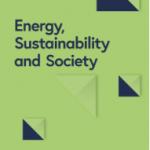An integrated ecosystem incorporating renewable energy leading to pollution reduction for sustainable development of craft villages in rural area: a case study at sedge mats village in Mekong Delta, Vietnam

Journal: Energy, Sustainability and Society
Authors: Thanh Hai Le, Van Thanh Tran, Quoc Vi Le, Thi Phuong Thao Nguyen, Hans Schnitzer, Gerhart Branding
Abstract:
Background: The sedge mats (dyeing, weaving processes, and small-scale livestock farm at the same place) craft villages in the Mekong Delta (Vietnam) are the most popular craft villages in Vietnam, especially in the Mekong Delta area. These craft villages generate typical emissions such as exhaust gas from burning fuel, wastewater from the sedge mats dyeing and weaving process, wastewater from livestock farm, and solid waste.
Methods: In this study, an ecological system, so-called VICRAIZES (Vietnam Craft villages Agro-based Industrial Zero Emission System), has been developed with the purpose to decrease pollution and enhance resource efficiency at those craft villages. The proposed ecosystem focused on measures such as (1) biogas tank (using residue pieces of solid sedge mats from weaving processing) supplied gas for burning the dyeing tank, (2) wastewater treatment system combining three components: innovative septic tank having upward flow thin baffles, anaerobic filter compartment, and bio-pond, and (3) composting area. The system was applied for a number of household craft villages in Dong Thap Province, Vietnam.
Results: The results of system demonstration show significant emission decreases: 93% greenhouse gas (CO2 and CH4), 97% BOD5 in wastewater, around 30kg/day biodegradable garbage are composted and used as organic fertilizers at the household needs (which increase family income of around 115 million VND/year), low initial investment and operating cost, simple operating procedure, etc., which are favorable and applicable at the low income sedge mats dyeing and weaving craft villages in the Mekong Delta area, Vietnam, and probably at other developing countries.
Conclusions: The VICRAIZES system implementation shows remarkable benefits/advantages on environmental,
economic, and technical aspects giving real chances for more comprehensive application at similar craft villages in
Vietnam and possibly in other developing countries.
